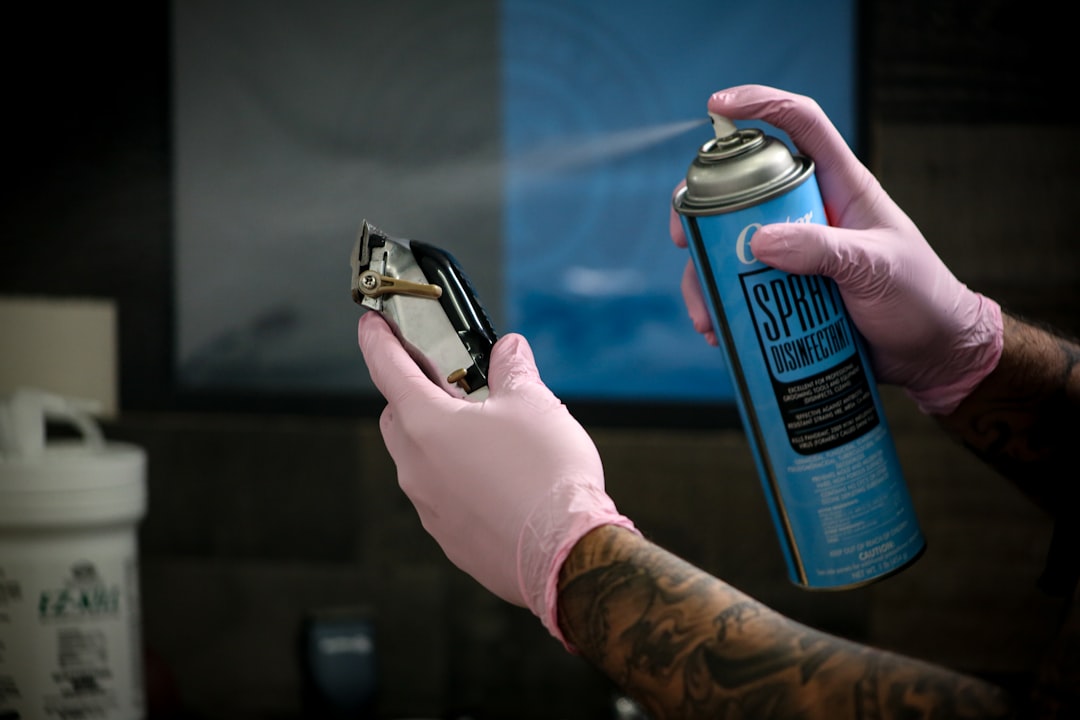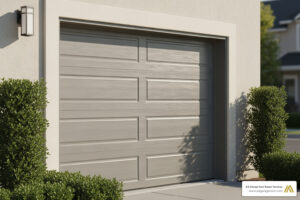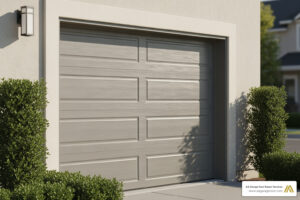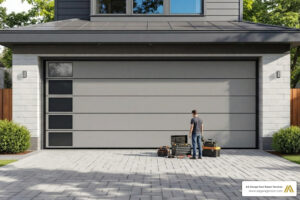Why Your Garage Door is Screaming for Professional Attention
Is your garage door making telltale squeaks, grinding sounds, or jerky movements? These aren’t just minor annoyances; they’re warning signs that your door’s moving parts are crying out for care. Garage door lubrication service is a crucial part of comprehensive garage door maintenance, yet it’s often overlooked. Proper lubrication extends your door’s lifespan by years, preventing premature breakdowns that could leave you stranded. This simple task reduces friction, prevents rust, and keeps your door operating smoothly and quietly.
Quick Answer: What Does Garage Door Lubrication Service Include?
- Moving Parts: Hinges, rollers, springs, and bearing plates
- Frequency: Every 6 months for most homes
- Best Lubricants: Silicone-based sprays and white lithium grease
- Avoid: Standard WD-40 (attracts dirt and dust)
- Benefits: Quieter operation, extended lifespan, prevents costly repairs
Without proper lubrication, metal components grind against each other, causing accelerated wear that leads to expensive repairs or complete system failure. With over 23 years of experience in garage door repair across Wisconsin and Minnesota, we’ve seen countless expensive repairs that could have been prevented with regular garage door lubrication service. This guide will show you how to keep your door running like new.
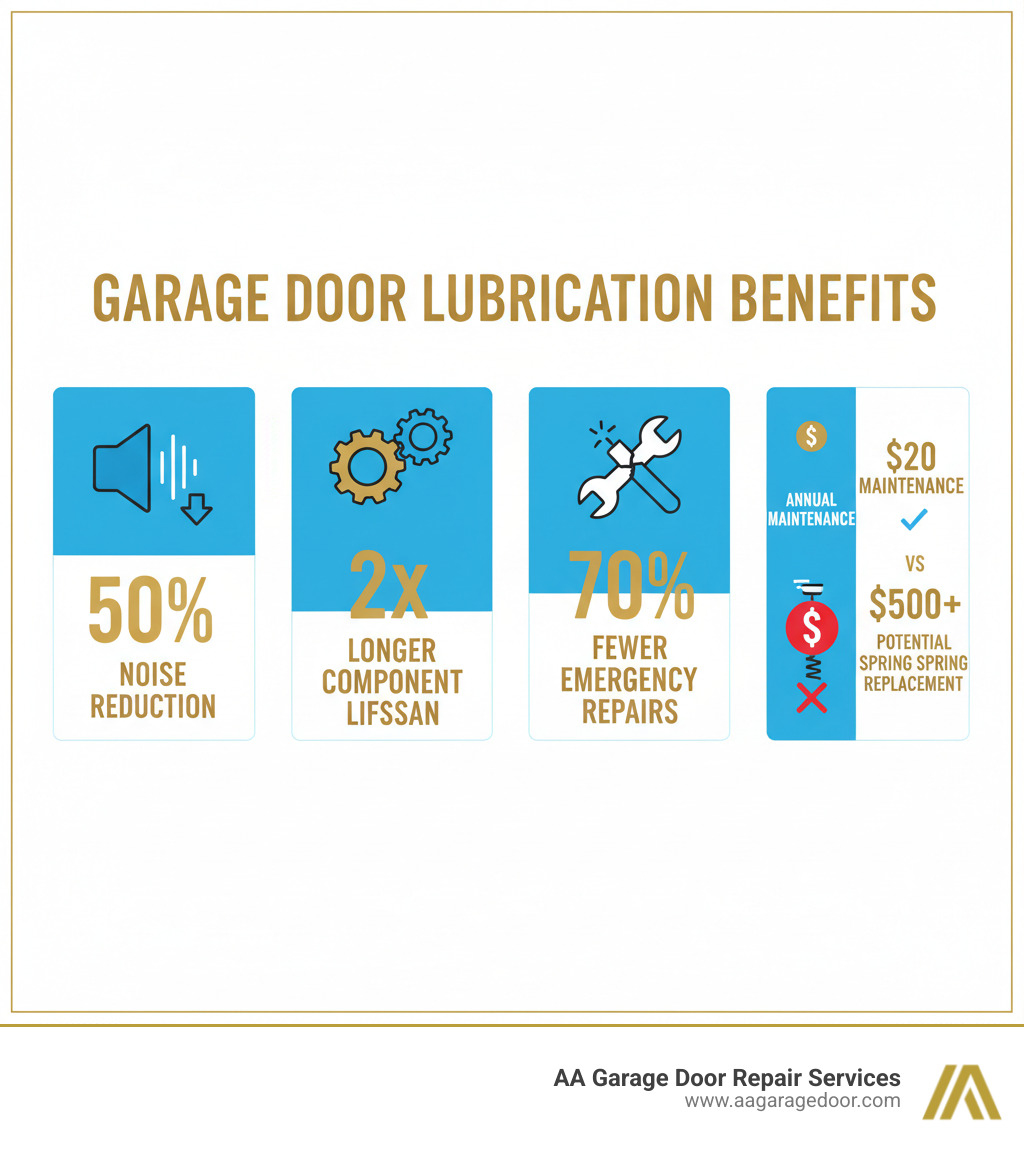
Handy garage door lubrication service terms:
Why Regular Lubrication is a Must for Your Garage Door
Your garage door is the largest moving part of your home, cycling thousands of times a year. Without proper care, its moving parts will protest loudly. We often find that many expensive problems could have been prevented with a simple, regular garage door lubrication service. An ounce of prevention is worth a pound of cure, especially when the “cure” could be hundreds in spring or opener repairs.
Signs of Neglect
Your garage door will tell you when it needs attention. Listen for these warning signs:
- Squeaking and Grinding Sounds: When unlubricated metal components grind together, they create noises that can wake the neighbors. This is your door’s cry for help.
- Straining Opener: If your opener moves slowly, shakes, or makes labored sounds, it’s likely compensating for a door fighting against itself due to dry parts.
- Jerky or Uneven Movement: A well-maintained door glides smoothly. If yours stutters or struggles, lack of lubrication is a probable cause, leading to increased wear and tear on all components.
- Visible Rust: This is a serious concern, signaling that moisture is damaging your door’s metal parts. Without the protective barrier of lubricant, rust spreads and weakens critical components.
All these signs point to costly repairs that are easily preventable. A $500 spring replacement can often be avoided with $20 of regular maintenance.
Benefits of Lubrication
Regular garage door lubrication service offers immediate and long-term benefits:
- Noise Reduction: Enjoy whisper-quiet operation after months of squeaking and grinding.
- Extended Lifespan: Reduce friction to add years to your garage door’s life. Springs especially benefit, flexing smoothly through thousands of cycles.
- Rust and Corrosion Prevention: In Minnesota and Western Wisconsin, harsh winters and humid summers accelerate metal deterioration. Lubricants create a protective shield against moisture.
- Reduced Friction and Improved Safety: A smoothly moving door puts less strain on the opener motor and drive system. This also reduces the risk of sudden component failure.
- Improved Energy Efficiency: A well-maintained door seals properly, preventing conditioned air from escaping.
For more detailed information on what maintenance your garage door requires, we encourage you to check out our comprehensive guide: What Maintenance Does a Garage Door Require?
The Right Tools: Choosing the Best Lubricants and Avoiding the Wrong Ones
Choosing the right lubricant for your garage door lubrication service is critical; the wrong product can cause more harm than good. Many homeowners use incorrect lubricants that attract dirt and turn a smooth system into a grinding mess. Your garage door faces unique challenges like temperature swings, dust, and heavy use, which require specialized products.
Recommended Garage Door Lubricants
For professional-grade results, two types of lubricants stand out:
- Silicone-Based Sprays: These are the workhorses of garage door maintenance. They repel dust and dirt, provide smooth operation, and create a protective barrier against moisture. A reliable choice is the Blaster Premium Silicone Garage Door Lubricant.
- White Lithium Grease: For heavy-duty, metal-on-metal contact points, this thick lubricant is ideal. It’s effective on springs and chains, offering long-lasting protection that won’t wash away. The WD-40 Specialist White Lithium Grease provides excellent water and rust resistance.
| Feature | Silicone-Based Spray | White Lithium Grease |
|---|---|---|
| Pros | Repels dust/dirt, resists temps, long-lasting, clean | Thick, heavy-duty, water/rust resistant, excellent for metal-on-metal |
| Cons | Less effective for heavy-duty gears/chains | Can attract some dirt if over-applied, messier to apply |
| Best For | Hinges, rollers (bearings), springs, bearing plates | Opener chains, metal gears, heavy-duty springs |
| Application | Spray | Spray or tube (grease) |
| Longevity | Good | Excellent |
| Temperature | Wide range | Wide range |
The Great Debate: Why You Shouldn’t Use Standard WD-40
A common mistake is using standard WD-40 for garage door maintenance. The “WD” stands for “Water Displacement”—it’s a degreaser, not a long-term lubricant. When sprayed on your door, it breaks down old grime but also removes the protective lubricants that were doing their job.
After it evaporates, standard WD-40 leaves a sticky residue that attracts dust and dirt. This creates an abrasive paste that increases friction and accelerates wear. Save WD-40 for removing sticky residue, but for proper garage door lubrication service, stick with products designed for the job.
Pre-Lubrication Checklist: Essential Maintenance Checks
Before starting your garage door lubrication service, a few preparation steps ensure a safe and effective job.
- Prioritize Safety: Disconnect power to the garage door opener by unplugging it or flipping the breaker. This prevents accidental operation. Wear safety glasses to protect your eyes from debris and spray.
- Inspect and Tighten Hardware: Daily vibrations loosen nuts and bolts. Use a wrench to tighten all visible hardware, especially on hinges and track brackets.
- Check for Damage: Look for worn rollers (lopsided, damaged bearings), cracked hinges, or other damaged parts. These may need replacement before lubrication. Warning: If you see frayed, rusted, or damaged lift cables, stop immediately and call a professional. These are under extreme tension and are dangerous to handle.
- Clean the Tracks: Use a damp cloth to wipe dirt and grime from the inside of the tracks. Automotive brake cleaner can remove stubborn buildup, but wipe the tracks dry afterward. Do not lubricate the tracks themselves.
- Perform a Balance Test: With the door closed and opener disconnected, pull the emergency release cord. Lift the door halfway and let go. A balanced door will stay in place; an unbalanced one will rise or fall. If it’s unbalanced, call for professional spring adjustment before proceeding.
Taking these steps ensures your lubrication service is both safe and effective. For more tips, see our guide on Pro Tips for Maintaining and Repairing Your Garage Door.
Your Step-by-Step Guide to a DIY Garage Door Lubrication Service
With preparation complete, you’re ready to perform a professional-quality garage door lubrication service. Gather your chosen lubricant (silicone spray or white lithium grease), clean rags, a step ladder, and safety glasses. Ensure the opener is still disconnected.
The Lubrication Process
- Hinges and Rollers: Apply a small amount of lubricant to the pivot points on each hinge. For steel rollers, spray lubricant into the ball bearings. For nylon rollers, only lubricate the bearings if they are exposed; do not spray the nylon wheel itself.
- Springs and Bearing Plates: Lightly coat the entire length of torsion springs (the large springs above the door). For extension springs (along the sides), lubricate the pulleys at each end. Also, apply a small amount of lubricant to the bearing plates at either end of the torsion spring shaft.
- Lock and Armbar: If you have a manual lock, a quick spray in the keyhole and latch will keep it working smoothly. Lubricate the pivot points on the armbar that connects the door to the opener.
- Opener Rail: For a chain drive opener, apply a thin layer of white lithium grease along the chain. Screw drive systems may also need lubrication (check your manual). Do not lubricate belt drive openers, as it can damage the belt.
- Wipe Away Excess: Use a clean rag to wipe off any excess lubricant. This is a crucial step to prevent dirt buildup and drips on your floor.
- Test the Door: Reconnect power to the opener and run the door through several cycles. Listen for the reduced noise and watch for smoother movement.
For more tips, check out our guide: 6 Tips to Maintain Your Garage Door.
What NOT to Lubricate
Knowing what to avoid is just as important.
- Garage Door Tracks: Never lubricate the tracks. They are meant to guide the rollers, and lubricant will create a sticky mess that attracts dirt and increases friction.
- Nylon Roller Wheels: The nylon portion of the roller is designed to be dry.
- Opener Belts: Most automatic opener belts are maintenance-free and can be damaged by lubricants.
How Often to Perform a Garage Door Lubrication Service
Don’t wait until your garage door sounds like a freight train to think about lubrication. The ideal frequency for a garage door lubrication service is every six months for most homes. This bi-annual schedule provides consistent protection without being excessive.
However, real-world conditions can alter this timeline. You may need to lubricate more often based on several factors:
- Climate and Environment: In dusty or humid areas, lubricant can become contaminated or break down faster, requiring application every 3-4 months. Coastal salt air is highly corrosive and may necessitate monthly checks.
- Extreme Temperatures: The temperature swings in Minnesota and Western Wisconsin, from -20°F to 90°F, cause metal to expand and contract. This puts extra stress on lubricants, reducing their effectiveness over time.
- Door Usage: If your garage door is your main entry and is used multiple times daily, its components are working overtime. High-traffic doors benefit from lubrication every 3-4 months.
- Age of the Door: Older garage doors, like vintage cars, require more frequent attention to keep them running smoothly.
A properly lubricated door is quieter and lasts longer. If you’re in the Baldwin, WI area and need advice custom to our local climate, we can help. Learn more about our garage door repair in Baldwin, WI.
Frequently Asked Questions about Garage Door Lubrication
Here are answers to common questions about garage door lubrication service.
What are the most common signs my garage door needs lubrication?
Your door will tell you when it needs attention. The most common signs are:
- Loud Noises: Squeaking, grinding, scraping, or rattling sounds during operation.
- Jerky Movement: The door stutters or struggles instead of gliding smoothly.
- Slow Operation: The door takes longer than usual to open or close, or the opener sounds strained.
- Visible Rust: Rust on hinges, rollers, or springs indicates unprotected metal.
My door is still noisy after lubrication. What’s next?
If noise persists after lubrication, it points to a deeper mechanical issue that lubrication can’t fix. The problem could be worn parts like rollers or hinges, misaligned tracks, or an unbalanced door. The noise might also come from the opener itself. When these issues arise, it’s time to call a professional who can diagnose the root cause. For comprehensive solutions, explore our full range of garage door repair services.
Can over-lubricating my garage door cause problems?
Yes. The “more is better” logic doesn’t apply here. Over-lubricating can cause several problems:
- Attracts Dirt: Excess lubricant becomes a dirt magnet, creating a gummy, abrasive paste that increases friction and wear.
- Sticky Buildup: This buildup can hinder smooth operation and cause parts to stick.
- Messy Drips: Excess lubricant will drip onto your garage floor, creating a slip hazard.
The key is to apply a thin, even coat and always wipe away any excess.
Your Partner in Garage Door Health
Regular garage door lubrication service is a simple, effective DIY task that acts as preventive medicine for your door. Taking 30 minutes twice a year to lubricate components invests in years of quiet, reliable performance and helps you avoid costly emergency repairs.
However, not everyone is comfortable with DIY maintenance, especially around high-tension springs. If, after lubrication, your door still grinds, moves unevenly, or if you spot serious issues like broken springs or frayed cables, it’s time to call in the professionals. Never attempt to repair springs or cables yourself—they are under extreme tension and can cause serious injury.
At AA Garage Door Repair Services, we have been the trusted choice for homeowners throughout St. Paul, Twin Cities, MN, and Western Wisconsin since 2001. We offer 24/7 emergency service with transparent pricing and a satisfaction guarantee. Whether you need a professional tune-up, complex repairs, or a system upgrade, our experienced team is ready to help.
When DIY maintenance isn’t enough, or you prefer professional peace of mind, we’re here to get your door back to its smooth, quiet self. If you’re considering a fresh start with a new system, contact our team to discuss the best options for your home.

